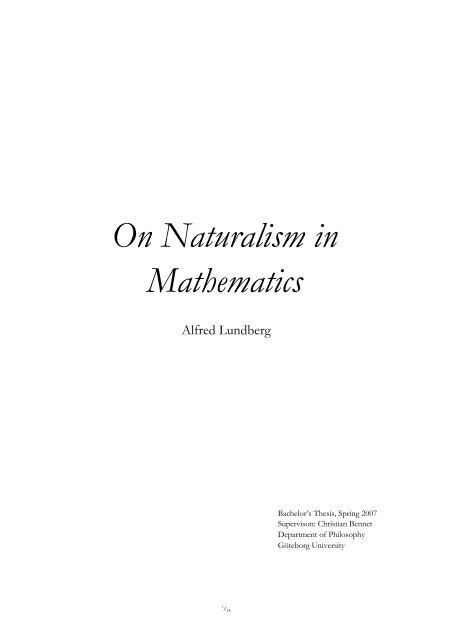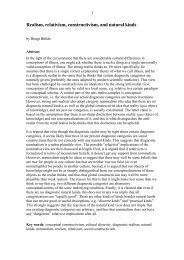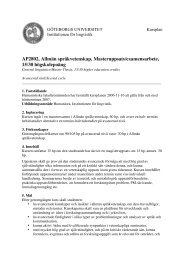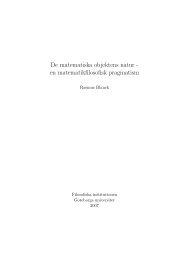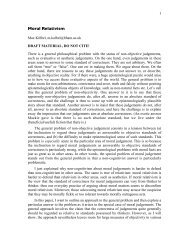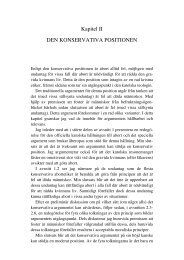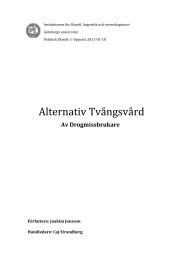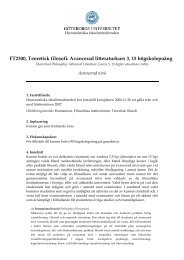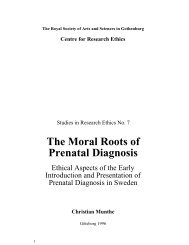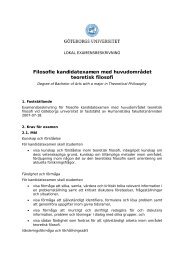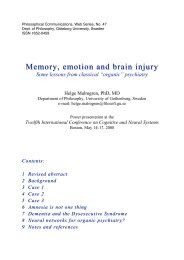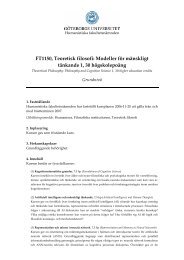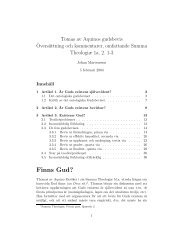On Naturalism in Mathematics
On Naturalism in Mathematics
On Naturalism in Mathematics
Create successful ePaper yourself
Turn your PDF publications into a flip-book with our unique Google optimized e-Paper software.
<strong>On</strong> <strong>Naturalism</strong> <strong>in</strong><br />
<strong>Mathematics</strong><br />
Alfred Lundberg<br />
Bachelor’s Thesis, Spr<strong>in</strong>g 2007<br />
Supervison: Christian Bennet<br />
Department of Philosophy<br />
Göteborg University<br />
1<br />
/ 26
Contents<br />
Contents.......................................................................................................................................2<br />
Introduction................................................................................................................................ 3<br />
Naïve Questions.............................................................................................................................................. 3<br />
Contemporary concerns................................................................................................................................. 4<br />
Naïve answers of naïve questions ................................................................................................................ 6<br />
Traditional Schools of Mathematical Philosophy ...................................................................................... 7<br />
Po<strong>in</strong>t of Departure.......................................................................................................................................... 9<br />
Qu<strong>in</strong>e’s philosophy.................................................................................................................. 10<br />
<strong>On</strong> <strong>On</strong>tology.................................................................................................................................................. 10<br />
An Empirical Dogma.................................................................................................................................... 11<br />
<strong>Naturalism</strong>...................................................................................................................................................... 12<br />
Mean<strong>in</strong>g accord<strong>in</strong>g to Qu<strong>in</strong>e....................................................................................................................... 13<br />
Qu<strong>in</strong>e on mathematics.................................................................................................................................. 13<br />
Maddy’s philosophy................................................................................................................. 15<br />
Criticism: Qu<strong>in</strong>e........................................................................................................................17<br />
<strong>Mathematics</strong> <strong>in</strong> the web................................................................................................................................ 18<br />
Mean<strong>in</strong>g.......................................................................................................................................................... 18<br />
<strong>On</strong>tology......................................................................................................................................................... 19<br />
Cartesian doubt is not the way to beg<strong>in</strong>..................................................................................................... 20<br />
Criticism: Maddy.......................................................................................................................22<br />
Conclusion.................................................................................................................................25<br />
References..................................................................................................................................26<br />
2<br />
/ 26
Introduction<br />
Philosophy has aimed to ask and answer clever questions on a wide variety of subjects<br />
throughout the ages. These can be summarized <strong>in</strong> a s<strong>in</strong>gle one:<br />
– <br />
Or, spelled out a bit:<br />
– What is its nature<br />
Turn<strong>in</strong>g towards mathematics, this can be differentiated and specified <strong>in</strong> several ways,<br />
each way result<strong>in</strong>g <strong>in</strong> one of the traditional philosophical questions of mathematics. These<br />
may, as <strong>in</strong> other philosophical fields, take simple or more technical form, but they orig<strong>in</strong>ate,<br />
at least historically, <strong>in</strong> common sense questions of the nature of mathematics. Therefore,<br />
a common sense start<strong>in</strong>g po<strong>in</strong>t for this exploration seems appropriate. Also, for people<br />
not familiar with the discipl<strong>in</strong>e this is supposedly the best approach. We will concentrate<br />
ma<strong>in</strong>ly on a philosopher who urged the leav<strong>in</strong>g beh<strong>in</strong>d of far-fetched philosophical<br />
theoriz<strong>in</strong>g <strong>in</strong> favour of common sense questions <strong>in</strong> a scientific context. Thus, this approach<br />
will not oppose his manners, but will on the contrary meet central standards of<br />
consequence.<br />
Naïve Questions<br />
So, what is mathematics What does it do What does it tell us <strong>Mathematics</strong> is a modern<br />
scientific field of research, but with roots of thousands of years. It is def<strong>in</strong>itely among the<br />
oldest subjects found at universities of today. Tak<strong>in</strong>g a closer look, many questions arise:<br />
What is the nature of mathematics This rather general question is seldom asked as it<br />
stands. It splits up <strong>in</strong>to a variety of more precise questions.<br />
What does mathematics talk about <strong>Mathematics</strong> seems to be about someth<strong>in</strong>g. Mathematicians<br />
talk as if they talked about someth<strong>in</strong>g. This, any grammatical analysis would consent<br />
to. Well, the answer seems quite simple: Numbers. <strong>Mathematics</strong> is about numbers, and<br />
their relations and their properties. It is also about functions and matrices, of course, and<br />
sets and po<strong>in</strong>ts and surfaces and so on. But several of these entities are of a somewhat<br />
strange nature. In what ways are these entities What are they, and where The ontological<br />
status of mathematical objects has been the subject for discussion throughout the ages.<br />
These objects seem to be, <strong>in</strong> a way, <strong>in</strong>dependent of our thoughts and wishes, yet they have<br />
a rather clear mental status, which connects them to the m<strong>in</strong>d, rather than the outer physical<br />
world.<br />
What is mathematical knowledge <strong>Mathematics</strong> seems to deliver knowledge <strong>in</strong> some sense.<br />
First of all, mathematical studies have the result that the student, <strong>in</strong>sofar as the studies are<br />
successful, feels that he knows more afterwards. <strong>Mathematics</strong> has been rigorously important<br />
<strong>in</strong> the development of the natural sciences. And science tells us someth<strong>in</strong>g about our<br />
environment. Thus, we have all the usual philosophical questions connected to knowl-<br />
3<br />
/ 26
edge, <strong>in</strong> their mathematical form: How do we acquire mathematical knowledge Mathematical<br />
knowledge seems more secure than other k<strong>in</strong>ds of knowledge, as it stands <strong>in</strong> no dependence<br />
upon empirical knowledge, or does it Anyhow, if so, how can that be And if<br />
mathematical knowledge is <strong>in</strong>dependent of sensory <strong>in</strong>put, how is it possible to expla<strong>in</strong> the<br />
remarkable success of mathematics <strong>in</strong> natural science Epistemology has traditionally been<br />
a central concern of the philosophy of mathematics.<br />
Are mathematical statements mean<strong>in</strong>gful, despite their scent of triviality How is it possible for<br />
mathematical statements to be mean<strong>in</strong>gful, as they only state what seems not to could<br />
have been otherwise, what seems to be trivially true<br />
Ever s<strong>in</strong>ce Pythagoras until our days, mathematics has been worshipped <strong>in</strong> strong romantic<br />
terms. The field is claimed to offer an unparalleled rational tra<strong>in</strong><strong>in</strong>g, to exhibit artand<br />
music-like beauty. It has been claimed to provide knowledge of the most secure form<br />
possible and it has <strong>in</strong>spired religious tendencies rang<strong>in</strong>g from Pythagorean number mysticism,<br />
via so-called sacred numbers appear<strong>in</strong>g <strong>in</strong> almost all major world religions, to cabbalistic<br />
permutation and the like. What is the real ground for these reactions What eternal<br />
virtues of mathematics does this witness<strong>in</strong>g really tell of<br />
Is our mathematical theory the only (possible) one Might another culture, another species,<br />
take a radically different l<strong>in</strong>e of mathematical development Thus, <strong>in</strong> practice we might<br />
ask whether there are other axiomatisations that are equally good but that differs essentially<br />
from our present one. If so, we would consider there to be two possible mathematics,<br />
thus reject<strong>in</strong>g uniqueness.<br />
Contemporary concerns<br />
The connections of mathematics to logic seem obvious. The fields share a range of attributes<br />
due to their common axiomatic and deductive method, their security of results, etc. It<br />
is hence not a surprise that efforts were made <strong>in</strong> the late 1800’s to establish mathematics<br />
on the grounds of logic alone. The notion of a collection or a class of objects was already<br />
<strong>in</strong> the air, and mathematician Gottlob Frege used the concept <strong>in</strong> try<strong>in</strong>g to provide a<br />
foundation for arithmetic. His aim was to establish the philosophical status of mathematics<br />
through giv<strong>in</strong>g a complete account for the natural numbers, and these he def<strong>in</strong>ed as<br />
classes of equ<strong>in</strong>umerous sets. Unfortunately, his logical system was shown <strong>in</strong>consistent 1 by<br />
Bertrand Russell not long after. To save the project one had to skip what was called the<br />
Axiom of Comprehension, and to rebuild the theory through specify<strong>in</strong>g a number of new<br />
axioms. This was done <strong>in</strong> order to weaken the system, to avoid contradiction, while reta<strong>in</strong><strong>in</strong>g<br />
most of its expressive powers, those necessary <strong>in</strong> express<strong>in</strong>g and prov<strong>in</strong>g the results of<br />
mathematics. This work was ma<strong>in</strong>ly accomplished by Richard Dedek<strong>in</strong>d, Abraham Fraenkel,<br />
Ernst Zermelo and Thoralf Skolem, and the result<strong>in</strong>g theory is commonly known as<br />
Set Theory, or ZFC 2 .<br />
1<br />
A system is <strong>in</strong>consistent if it proves a contradiction, consistent otherwise.<br />
2<br />
ZFC denotes the Zermelo-Fraenkel axiomatisation of set theory, together with the Axiom of Choice. This<br />
system is widely accepted as the foundation of all of mathematics, though not the only set theory.<br />
4<br />
/ 26
The notion of equ<strong>in</strong>umerous sets was also the basis for Georg Cantor’s theory of card<strong>in</strong>al<br />
numbers. In it, Cantor established some nontrivial facts on the number of elements<br />
of sets, applicable on sets of numbers through their <strong>in</strong>terpretation <strong>in</strong> ZFC. Now, one soon<br />
ran <strong>in</strong>to further worries, as one of Cantor’s hypotheses proved to be <strong>in</strong>dependent of the<br />
axioms of ZFC 3 , and more examples have later been found. Thus, Frege’s <strong>in</strong>itial theory<br />
had proved erroneous, <strong>in</strong> allow<strong>in</strong>g contradictions to be deduced, and so be<strong>in</strong>g to strong.<br />
And its replac<strong>in</strong>g theory, ZFC, now proved to be too weak, as it was not able to settle natural<br />
questions appear<strong>in</strong>g <strong>in</strong> the theory. This is the picture still today. Hence, the question<br />
arises, what are we to do about such results For every such question, is it to be answered<br />
<strong>in</strong> the affirmative or <strong>in</strong> the negative, when the theory cannot advise Or should we simply<br />
accept their <strong>in</strong>dependence If mathematics is about real, somehow exist<strong>in</strong>g, objects, what<br />
moral is to be drawn from such a situation And how will mathematics proceed<br />
But more is to be said on logic and mathematics, and even more <strong>in</strong>trigu<strong>in</strong>g questions<br />
arise. Among the most important logical results to this day are the so called Incompleteness<br />
Theorems that were proved by Kurt Gödel <strong>in</strong> 1930. These results came as a mere<br />
chock to the contemporary mathematico-logical society. David Hilbert had <strong>in</strong> 1899<br />
showed how the Euclidean geometry could be formalized <strong>in</strong> a first order logic, and Alfred<br />
Tarski proved some years later that Hilbert’s theory was complete and decidable 4 . Now,<br />
the hope was to repeat the feat for number theory. Through the works of Richard Dedek<strong>in</strong>d,<br />
Giuseppe Peano and others, the Peano Arithmetic, PA, was formulated as a logical theory<br />
of first order, and the idea was now to provide rigorous ground for that also PA was<br />
complete and decidable. This project was completely overthrown by Gödels results. His<br />
first theorem shows that <strong>in</strong> any axiomatizable first order theory T that is consistent and <strong>in</strong>cludes<br />
PA, we can construct true sentences, <strong>in</strong> the language of T, that do not have a proof<br />
or a disproof. That is, any such theory, PA <strong>in</strong>cluded, is not complete. In his second theorem,<br />
Gödel showed that this result has consequences for what can be said about consistency.<br />
Any logical theory aim<strong>in</strong>g to found mathematics must account for number theory.<br />
In fact, with number theory at hand, most of classical mathematics can be constructed. So<br />
mathematics without number theory is simply not imag<strong>in</strong>able. Now, the second <strong>in</strong>completeness<br />
theorem says that if we are to formalize mathematics <strong>in</strong> an axiomatizable theory<br />
T that <strong>in</strong>cludes PA, and we do this <strong>in</strong> first order logic, then T cannot prove its own consistency.<br />
Thus, we may not, <strong>in</strong> first order logic at least, account for the consistency of<br />
mathematics, us<strong>in</strong>g elementary mathematical methods. Now, the reason we would want to<br />
do this <strong>in</strong> first order logic, is that, while second order logic can account completely for<br />
number theory 5 , it has no complete deductive system. <strong>On</strong> the other hand, any logic with<br />
such a system, first order or not, would aga<strong>in</strong> be subject to Gödels theorem. It appears<br />
thus that we cannot, as far as mathematical methods can guide, be certa<strong>in</strong> of the consistency<br />
of mathematics. And also, it appears as number theory <strong>in</strong>evitably conta<strong>in</strong>s statements<br />
3<br />
The Cont<strong>in</strong>uum Hypothesis, that any set of real numbers either is equ<strong>in</strong>umerous to the set of all real numbers,<br />
or to the set of natural numbers, or is f<strong>in</strong>ite, was proved <strong>in</strong>dependent of Set Theory by Paul Cohen <strong>in</strong><br />
1963.<br />
4<br />
A theory is complete if every sentence <strong>in</strong> the language of the theory has a proof or a disproof from the axioms.<br />
It is further decidable if there is an algorithm for determ<strong>in</strong><strong>in</strong>g for any such sentence that it is a theorem, i.e.<br />
has a proof, or not.<br />
5<br />
Dedek<strong>in</strong>d formalized number theory <strong>in</strong> second order logic <strong>in</strong> 1880, and subsequently showed it to have exactly<br />
all true statements of number theory as theorems.<br />
5<br />
/ 26
that can be proved neither true nor false. This is of course a fact contradictory to what<br />
might be called an advanced naïve view on mathematics, as held by mathematicians<br />
throughout mathematical history.<br />
Thus, at a first philosophical glance at mathematics, the follow<strong>in</strong>g themes of question<strong>in</strong>g<br />
arise:<br />
~ What is its nature<br />
~ The ontology of mathematics<br />
~ Applicability<br />
~ Mathematical epistemology<br />
~ Mean<strong>in</strong>g and mathematics<br />
~ Eternal virtues<br />
~ Uniqueness<br />
~ Incompleteness of the axioms of set theory<br />
~ Incompleteness <strong>in</strong> the sense of Gödels theorems<br />
Surely, there is no limit to the complexity of philosophical questions on mathematics,<br />
this aims just to account for the major areas of <strong>in</strong>terest.<br />
Naïve answers of naïve questions 6<br />
Given a multitude of ‘naïve’ philosophical questions on the nature of mathematics, we<br />
might as well try to answer first <strong>in</strong> a completely commonsensical spirit, just to get oriented,<br />
just to establish a common view po<strong>in</strong>t of reference <strong>in</strong> order to prevent any unnecessary<br />
tak<strong>in</strong>g off <strong>in</strong>to too philosophical abstractions, or at least to make any such divergence<br />
evident and explicit. Little would <strong>in</strong>deed be ga<strong>in</strong>ed <strong>in</strong> <strong>in</strong>sight if we came up with<br />
fancy theories, but were unable to relate them to common sense and the every day mean<strong>in</strong>g<br />
of words <strong>in</strong>volved. Briefly, then the follow<strong>in</strong>g is taken to be widely accepted first impressions<br />
of the science.<br />
In its everyday use, ‘mathematics’ may well be used <strong>in</strong> the follow<strong>in</strong>g senses: ‘<strong>Mathematics</strong><br />
is an activity’, just as any other scientific field. ‘<strong>Mathematics</strong> is a language’, the mathematical<br />
theories have communicative uses, much seems to be possible to formulate <strong>in</strong> the<br />
language of mathematics. Further, ‘<strong>Mathematics</strong> is symbols on papers’, and ‘<strong>Mathematics</strong><br />
exists <strong>in</strong> some way <strong>in</strong> our m<strong>in</strong>ds’. But while mathematics ‘occurs’ <strong>in</strong> our m<strong>in</strong>ds, the mathematical<br />
results seem remarkably <strong>in</strong>dependent of this m<strong>in</strong>d.<br />
It seems <strong>in</strong>deed to speak of objects of some k<strong>in</strong>d, but no one has ever seen any, nor<br />
are we very well advised on the nature of their existence. Somehow, is the immediate conclusion,<br />
the nature of existence seems not very central to mathematics. Seem<strong>in</strong>gly, it has<br />
noth<strong>in</strong>g to do with the essence of mathematics.<br />
If mathematics is to take place, <strong>in</strong> equal extent, <strong>in</strong> the head, on a sheet of paper, and<br />
<strong>in</strong> computers, then one would assume some similar characteristics of these media and the<br />
6<br />
These statements are ma<strong>in</strong>ly drawn from [Bennet].<br />
6<br />
/ 26
m<strong>in</strong>d. If the scientific understand<strong>in</strong>g of the m<strong>in</strong>d is the bra<strong>in</strong>, then from what we know of<br />
the bra<strong>in</strong> and the work<strong>in</strong>gs of computers, this would be a structural likeness. This seems<br />
perhaps more reasonable, look<strong>in</strong>g from the common sense view po<strong>in</strong>t, than an existence<br />
and a related perception of unseen objects.<br />
<strong>Mathematics</strong> seems appropriate when reveal<strong>in</strong>g relations we had not foreseen. But<br />
once discovered, the results seem undeniable, and often trivial. So we experience a mean<strong>in</strong>g<br />
through lay<strong>in</strong>g bare, formerly hidden, but trivial, and necessary results.<br />
The eternal virtues of mathematics seem to be the effect of its nonnegotiable results,<br />
its strict rule-governed behaviour. Its beauty due to the succulence of f<strong>in</strong>al <strong>in</strong>sight of trivial<br />
truths, the art-likeness due to its pattern-modell<strong>in</strong>g, its unlimited complexity potential,<br />
and so on.<br />
F<strong>in</strong>ally the possibility of a similar realm of thoughts, of equal use, but of a dist<strong>in</strong>guishable<br />
character seems unbelievable, but admittedly on vague grounds.<br />
Traditional Schools of Mathematical Philosophy 7<br />
The traditional schools of philosophy of mathematics all arose, <strong>in</strong> their modern versions,<br />
<strong>in</strong> the late n<strong>in</strong>eteenth century, but carry obvious residue from their philosophical ancestors.<br />
In addition the terms Logicism and Fictionalism will be expla<strong>in</strong>ed:<br />
Realism – This view considers the field of mathematics to be a science of a matter of<br />
fact, attributed to the world. For the realist dist<strong>in</strong>guishes truth from knowledge. The<br />
mathematician becomes an explorer, rather than an <strong>in</strong>ventor, for the mathematical landscape<br />
is ‘already there’, wait<strong>in</strong>g for us to discover it. Therefore, <strong>in</strong>dependent questions of<br />
set theory are assumed to have their answers despite their logical <strong>in</strong>dependence of the axioms.<br />
We need just take a look <strong>in</strong> the realm of sets. Therefore, the axioms of the theory<br />
must be judged <strong>in</strong>complete <strong>in</strong> some sense, they do not completely account for the universe<br />
of sets. It follows that the foundational problems concern the actual logical theories<br />
rather than the mathematical questions, or mathematics ‘itself’. Some philosophers (Gödel<br />
e.g.) claim that we acquire mathematical <strong>in</strong>sight through some special faculty of mathematical<br />
perception. As there is no such imag<strong>in</strong>able th<strong>in</strong>g as the simultaneous be<strong>in</strong>g and nonbe<strong>in</strong>g<br />
of an eternal object, or the hav<strong>in</strong>g and non-hav<strong>in</strong>g of a given property, of a certa<strong>in</strong><br />
number, realism must be taken to imply the consistency of arithmetic and set theory, if<br />
not of the actual logical systems of arithmetic and set theory. As the mathematical theory<br />
models the relations <strong>in</strong> the one mathematical realm, uniqueness must follow too. The<br />
eternal virtues of mathematics are, it is proposed, best understood <strong>in</strong> connection to their<br />
mystical metaphysical status, and the related perceiv<strong>in</strong>g of such entities. The mean<strong>in</strong>g of a<br />
statement of mathematics is someth<strong>in</strong>g parallel to mean<strong>in</strong>g <strong>in</strong> ord<strong>in</strong>ary scientific or commonsensical<br />
context. <strong>Mathematics</strong> talks of a matter of fact as much as does science.<br />
Intuitionism was founded by L. E. J. Brouwer <strong>in</strong> an attempt to reconstruct mathematics<br />
<strong>in</strong> accordance with epistemological idealism and Kantian metaphysics. The natural numbers<br />
are the primary objects of mathematical knowledge. These spr<strong>in</strong>g from immediate<br />
7<br />
This section orig<strong>in</strong>ates from, <strong>in</strong> addition to Maddy, the encyclopaedia articles listed under ‘References’.<br />
7<br />
/ 26
temporal experience. Therefore, the objects of mathematics stand <strong>in</strong> ultimate dependence<br />
on an experienc<strong>in</strong>g m<strong>in</strong>d. In this sense, the mathematician <strong>in</strong>vents his mathematical objects.<br />
Thus mathematics is not an attribute of the world, but rather of our experience. This<br />
accounts for the applicability of mathematics on the experienced world. Accord<strong>in</strong>g to<br />
Brouwer, there are no unexperienced truths, therefore mathematical results must be based<br />
on <strong>in</strong>tuitive clarity rather then logical proof, and so a mathematical claim is true if one <strong>in</strong>tuitively<br />
understands every stage of the proof process. In that, mathematical knowledge is<br />
a priori and <strong>in</strong>tuitive. Also, we may read out a theory of mean<strong>in</strong>g where constructive proof<br />
replaces the ord<strong>in</strong>ary correspondence notion of truth. The mathematical knowledge is<br />
thus profoundly l<strong>in</strong>ked to our experience of the world, and this attributes to it its glossy<br />
guise. Brouwer accepted the formalisation of <strong>in</strong>tuitionistic logic, and this would suggest<br />
that mathematics describes an aspect common to many, and not completely subjective.<br />
Therefore mathematics must be the only of its k<strong>in</strong>d.<br />
Formalism is a mathematical relative of the much older doctr<strong>in</strong>e of nom<strong>in</strong>alism. The<br />
nom<strong>in</strong>alist view is that concepts at large do not have separate be<strong>in</strong>g <strong>in</strong> any abstract way.<br />
They are but symbols. So, the formalist rejects any type of abstract mathematical entities,<br />
mathematics is no more than a rule-governed game of <strong>in</strong>significant notation. The game<br />
might well be of great practical utility, but this implies <strong>in</strong> no way a significance of the literal<br />
l<strong>in</strong>guistic k<strong>in</strong>d. David Hilbert, the central advocate of this view, held that f<strong>in</strong>itary mathematics<br />
describes <strong>in</strong>dubitable facts about real objects, but that one <strong>in</strong>troduces the ‘ideal’<br />
objects that feature elsewhere just <strong>in</strong> order to facilitate research about the former. The reference<br />
to real objects establishes uniqueness of arithmetic, and thereby of all of mathematics.<br />
This relation to the physical world would expla<strong>in</strong> some of the virtues attributed to<br />
mathematics. Mathematical knowledge amounts to knowledge of the behaviour of a game<br />
of symbols, and of some aspects of the physical world.<br />
Logicism was the attempt to found all of mathematics on logic, and thus to provide<br />
both ontological and epistemological clarity. Gottlob Frege was the pioneer through his<br />
attempts <strong>in</strong> construct<strong>in</strong>g mathematical objects from logical concepts alone. Bertrand Russell<br />
further cont<strong>in</strong>ued the efforts <strong>in</strong> his Type Theory, so to avoid the paradoxes discovered<br />
<strong>in</strong> Frege’s system, but he was forced to use ad hoc axioms to be able to account for the<br />
real numbers. The Hilbert Program aimed to secure mathematics through reduc<strong>in</strong>g mathematical<br />
theory to formal systems, and then prove the consistency of these. As we’ve seen,<br />
these efforts have not been successful so far. <strong>On</strong>e first thought that this was possible us<strong>in</strong>g<br />
elementary, mathematical methods, <strong>in</strong>volv<strong>in</strong>g number theory, but this project was<br />
dealt a lethal blow from the results of Kurt Gödel. It is still up to discussion whether or<br />
not his results put an end to Logicism.<br />
Fictionalism, or <strong>in</strong>strumentalism, is the view that rather than aim<strong>in</strong>g at literal truth, sentences<br />
or the use of objects <strong>in</strong> science or mathematics is to be seen as a fiction, a way of<br />
speech, which may have various pragmatic advantages. Thus statements are not true or<br />
false, but convenient or <strong>in</strong>convenient. In mathematics, we talk as if numbers exist, because<br />
do<strong>in</strong>g so permits us to construct various th<strong>in</strong>gs <strong>in</strong> technology, take various associative<br />
steps <strong>in</strong> science or reason<strong>in</strong>g, but by say<strong>in</strong>g ‘2’ we do not succeed <strong>in</strong> actually referr<strong>in</strong>g to<br />
anyth<strong>in</strong>g <strong>in</strong> particular.<br />
8<br />
/ 26
Po<strong>in</strong>t of Departure<br />
Given the questions <strong>in</strong>troduced, the aim is now to approach the philosophy of Willard<br />
Van Orman Qu<strong>in</strong>e, and take a closer look at its consequences <strong>in</strong> the philosophy of mathematics.<br />
Penelope Maddy offers an account that has clear mathematical sympathies and<br />
her book, [Maddy], is thus a major source of the account at hand.<br />
There, she sets out to <strong>in</strong>vestigate the possibilities of a modern, mathematical method<br />
of research, firmly based on an aimed-for, accurate view of what have been basic conditions<br />
for the massive mathematical development over the last two hundred years. Her <strong>in</strong>terests<br />
are chiefly methodological, but she grounds her conclusions <strong>in</strong> a variation of the<br />
naturalistic outcomes of Qu<strong>in</strong>ean thought. <strong>On</strong>e that takes actual mathematics as central,<br />
that “extends the same respect to mathematical practice that the Qu<strong>in</strong>ean naturalist extends<br />
to scientific practice” 8 . Despite methodological concerns, her <strong>in</strong>vestigation also<br />
provides an account of the metaphysical results of the stance.<br />
These pages, though, will overlook methodological <strong>in</strong>tents. The objective is to ask the<br />
ord<strong>in</strong>ary questions, and to answer them <strong>in</strong> a Qu<strong>in</strong>ean spirit, not<strong>in</strong>g <strong>in</strong> what ways Maddy’s<br />
variation of his thoughts br<strong>in</strong>gs her to differ<strong>in</strong>g conclusions.<br />
Further, a criticiz<strong>in</strong>g part will scrut<strong>in</strong>ize their ideas, establish<strong>in</strong>g the relations of dependence,<br />
look<strong>in</strong>g for misconceptions and overly optimistic conclusions, and ask questions<br />
on their success <strong>in</strong> answer<strong>in</strong>g the naïve questions of the philosophy of mathematics<br />
<strong>in</strong> a satisfy<strong>in</strong>g way.<br />
Qu<strong>in</strong>e is chosen on the basis of the still central role of his philosophy <strong>in</strong> the contemporary<br />
debate. His thoughts dissolve, or so aim to, the traditional dispute on the metaphysics<br />
of mathematics, <strong>in</strong>troduced above, and offer a modern, sound and sane view of<br />
the role of science, and, thereby, of mathematics. This commonsensical spirit motivates<br />
our outset <strong>in</strong> naïve questions on mathematics.<br />
8<br />
[Maddy], p185 (henceforth referred to just by ‘p185’)<br />
9<br />
/ 26
Qu<strong>in</strong>e’s philosophy<br />
The philosophy of Qu<strong>in</strong>e emerges from a deep conviction to empiricism, a conviction<br />
that scientific evidence is what evidence there is for any given statement about the world.<br />
Qu<strong>in</strong>e’s <strong>in</strong>teractions with Rudolph Carnap, who stressed the importance of the l<strong>in</strong>guistic<br />
framework of statements for their mean<strong>in</strong>gfulness, are present through his understand<strong>in</strong>g<br />
of scientific research of all branches as parts of an over-all scientific project, the unique<br />
scientific framework. Although <strong>in</strong>fluenced to a certa<strong>in</strong> degree, Qu<strong>in</strong>e would not follow<br />
Carnap <strong>in</strong> his thus implied views on mathematical mean<strong>in</strong>g and ontology.<br />
A few themes will here be accounted for, that are central to Qu<strong>in</strong>e’s view on mathematics,<br />
and which appear <strong>in</strong> the version given by Penelope Maddy.<br />
<strong>On</strong> <strong>On</strong>tology<br />
Questions ga<strong>in</strong> their <strong>in</strong>telligibility from the l<strong>in</strong>guistic framework <strong>in</strong> which they occur. That<br />
is Carnap’s po<strong>in</strong>t. Carnap took ontological questions to be external to any l<strong>in</strong>guistic framework,<br />
he took the acceptance of them to be part of the very adoption of such a framework,<br />
and thus to be a pragmatic, rather then a theoretical question. Posed outside the<br />
framework, ontological questions were but pseudo-questions, with noth<strong>in</strong>g to provide<br />
standards by which they were to be evaluated – <strong>in</strong>side the framework they were trivial. For<br />
<strong>in</strong>stance, <strong>in</strong> discuss<strong>in</strong>g number theory the existence of 2 is a trivial, s<strong>in</strong>ce presupposed,<br />
matter. If, on the other hand, we take a step back and ask whether 2 really exists, then we<br />
are outside the explanatory framework that specifies what is meant by ‘2’ so that our question<br />
becomes un<strong>in</strong>telligible, mean<strong>in</strong>gless, as a theoretical question. Thus, the issue of the<br />
‘real’ existence of 2 is settled <strong>in</strong>directly through our adoption of a framework that <strong>in</strong>cludes<br />
‘2 exists’ as a part. And whether to adopt or not a given framework is a practical, rather<br />
than theoretical, matter.<br />
With the over-all scientific theory <strong>in</strong> view, also Qu<strong>in</strong>e would take ontological questions<br />
for mean<strong>in</strong>gless outside this scientific context, but, oppos<strong>in</strong>g Carnap, he considers<br />
these to have mean<strong>in</strong>gful counterparts <strong>in</strong>side science 9 . These outer questions should be<br />
adopted on pragmatic grounds, such as simplicity, economy, efficiency, just as Carnap argued.<br />
But Qu<strong>in</strong>e notes that this is really the ground for adoption of any theory, or any theoretic<br />
part, of science. Thus <strong>in</strong> the framework of overall science, pragmatic standards are<br />
an <strong>in</strong>tegral part of the very framework. Thus ontological questions, those who would be<br />
settled on pragmatic grounds, have their <strong>in</strong>telligible, <strong>in</strong>ternal counterparts <strong>in</strong> the scientific<br />
context.<br />
So, how are we thus to understand a scientific statement of existence There is noth<strong>in</strong>g<br />
about ‘real existence’ for Qu<strong>in</strong>e; electrons don’t ‘really exist’. But the assertion of existence<br />
of electrons is central to the scientific field. It is an important component without<br />
9<br />
Rather, Qu<strong>in</strong>e would say that ontological questions are <strong>in</strong>ternal to science, while Carnap would consider<br />
them external, and therefore mean<strong>in</strong>gless.<br />
10<br />
/ 26
which science would def<strong>in</strong>itely not be the same. The observation is thus, that science, as it<br />
is, <strong>in</strong>cludes the existence of electrons as a façon de parler, an assertion that has mean<strong>in</strong>g <strong>in</strong><br />
relation to all other assertions made by science, and this extends to all scientific claims:<br />
“Scientific knowledge is a man-made fabric which touches perceptions only along the<br />
edges.” 10 Qu<strong>in</strong>e holds that this is the only mean<strong>in</strong>g ontological questions can acquire.<br />
Now Qu<strong>in</strong>e performs a logical trick: In form<strong>in</strong>g our over-all science, we can judge its<br />
ontology by look<strong>in</strong>g at what it claims there is. So, by adopt<strong>in</strong>g a given theory, we commit<br />
ourselves to its ontology, that is, to the th<strong>in</strong>gs that exist accord<strong>in</strong>g to the theory. This is<br />
Qu<strong>in</strong>e’s <strong>On</strong>tological Commitment.<br />
An Empirical Dogma<br />
Oppos<strong>in</strong>g Carnaps attempt to dist<strong>in</strong>guish the mathematical from the physical portion of<br />
the over-all scientific framework, of which they agree <strong>in</strong> large 11 , Qu<strong>in</strong>e directs a severe attack<br />
on an old, as he says, “metaphysical article of faith” 12 . His attack concerns the<br />
concept of analyticity.<br />
This notion has been around <strong>in</strong> philosophical debate for quite a while. Kant considered,<br />
as an important part of his metaphysics, the possibility of synthetic truths known<br />
a priori. The whole idea is that an analytic statement is a true statement which is so solely<br />
<strong>in</strong> virtue of the mean<strong>in</strong>gs of the words used. That is, it is a trivial truth <strong>in</strong> the sense that if<br />
you properly understand the concepts <strong>in</strong>volved, if you know their mean<strong>in</strong>g, then you cannot<br />
deny what is said. Qu<strong>in</strong>e’s po<strong>in</strong>t is that the concept of analyticity is ill-founded. His argument<br />
is found <strong>in</strong> his “Two Dogmas of Empiricism” 13 and runs along the follow<strong>in</strong>g<br />
l<strong>in</strong>es:<br />
First, analytic statements have been def<strong>in</strong>ed as statements whose denials are self-contradictory.<br />
Any similar def<strong>in</strong>ition lacks explanatory power. These two notions are “the two<br />
sides of a s<strong>in</strong>gle dubious co<strong>in</strong>” 14 .<br />
In a similar ve<strong>in</strong>, Qu<strong>in</strong>e proceeds to scrut<strong>in</strong>ize a variety of attempts made to clarify<br />
the notion. He considers Kant’s metaphorical notion of ‘conta<strong>in</strong>ment’, Frege’s work on<br />
the relation of mean<strong>in</strong>g and reference. He traces the explanatory ground for mean<strong>in</strong>g to<br />
that of ‘synonymy’, but, aga<strong>in</strong>, he ends up with an explanation ow<strong>in</strong>g to an understand<strong>in</strong>g<br />
of some other, equally ill-founded, concept. The way through ‘def<strong>in</strong>ition’ seems appeal<strong>in</strong>g,<br />
but adds noth<strong>in</strong>g to our understand<strong>in</strong>g. All such, accept the postulat<strong>in</strong>g k<strong>in</strong>d, “h<strong>in</strong>ges on<br />
prior relationships of synonymy” 15 . So we’re back at where we started.<br />
Further, Qu<strong>in</strong>e has a go at ‘<strong>in</strong>terchangeability salva veritate’. He considers the predicate<br />
‘necessarily’, but po<strong>in</strong>ts out that such a predicate does <strong>in</strong>deed presuppose a satisfactory<br />
10<br />
p102, this is closely l<strong>in</strong>ked to the Qu<strong>in</strong>ean view, that stems from Duhem, and which is called the Duhem<br />
Thesis, that physical theories are accepted or rejected as a whole, and not statement by statement [Cambridge<br />
Dictionary of Philosophy].<br />
11<br />
p177<br />
12<br />
[Qu<strong>in</strong>e], II.5, p37.<br />
13<br />
[Qu<strong>in</strong>e], I.<br />
14<br />
[Qu<strong>in</strong>e], II.1, p20.<br />
15<br />
[Qu<strong>in</strong>e], II.3, p27.<br />
11<br />
/ 26
understand<strong>in</strong>g of ‘analyticity’. Such an understand<strong>in</strong>g can be obta<strong>in</strong>ed <strong>in</strong> an external language,<br />
but troubles appear here as well: Extensional agreement, what synonymy becomes<br />
<strong>in</strong> this context, is far from the type of cognitive synonymy that is needed for the elucidation<br />
of ‘analyticity’. In an <strong>in</strong>tentional language, analyticity is presupposed.<br />
Qu<strong>in</strong>e’s last attempt is about semantic rules. Obviously, a semantic rule, itself conta<strong>in</strong><strong>in</strong>g<br />
‘analyticity’, is of no help. We know very well which <strong>in</strong>stances of the language we<br />
might apply the predicate of ‘analyticity’ to, but we know noth<strong>in</strong>g more of what this says<br />
about the considered sentences. We might then consider, Qu<strong>in</strong>e proposes, differentiat<strong>in</strong>g<br />
among true statements; any analytic statement is of course among these. We might say<br />
that sentences true by virtue of specific semantic rules are to be labelled ‘analytic’. But<br />
even here, noth<strong>in</strong>g is ga<strong>in</strong>ed. For the reference to ‘semantic rule’ is as dubious and unclear<br />
as is the notion of analyticity itself.<br />
Qu<strong>in</strong>e’s conclusion is thus that any attempt to clarify what is meant <strong>in</strong> the use of ‘analytic’<br />
is condemned to fail. In his own words, “for all its a priori reasonableness, a boundary<br />
between analytic and synthetic statements simply has not been drawn” 16 .<br />
<strong>Naturalism</strong><br />
As we have seen, Qu<strong>in</strong>e claims that ontological questions are to be understood <strong>in</strong>, and<br />
only <strong>in</strong>, the framework of over-all science. But these are not the only philosophical questions<br />
that have dim evidential standards. As Qu<strong>in</strong>e only f<strong>in</strong>ds one legitimate ground for<br />
understand<strong>in</strong>g statements about ‘how it is’, philosophical questions are <strong>in</strong>telligible just <strong>in</strong><br />
so far as they have counterparts <strong>in</strong> this context. That is, questions on epistemology, for example,<br />
can only be properly understood <strong>in</strong> their scientific versions, as questions of how<br />
human be<strong>in</strong>gs, as understood by science, acquire <strong>in</strong>formation of the physical world, as understood<br />
by science. There is no other understand<strong>in</strong>g of these questions. The traditional<br />
philosophical goal of epistemology has been to found science on some secure, extra-scientific<br />
cornerstone, but we must give up the Cartesian dream, Qu<strong>in</strong>e urges.<br />
In sum then, this abandonment of traditional philosophical goals, due to lack of <strong>in</strong>telligibility,<br />
Qu<strong>in</strong>e calls ‘naturalism’. This is “the recognition that it is with<strong>in</strong> science itself,<br />
and not <strong>in</strong> some prior philosophy, that reality is to be identified and described” 17 . Thus,<br />
science appears as “an <strong>in</strong>quiry <strong>in</strong>to reality, fallible and corrigible but not answerable to any<br />
supra-scientific tribunal, and not <strong>in</strong> need of any justification beyond observation and the<br />
hypothetico-deductive method” 18 .<br />
The abandonment of the goals of a first philosophy means not that all questions<br />
asked by philosophers are left beh<strong>in</strong>d. Those which are possible to ask <strong>in</strong>side the scientific<br />
framework are as good as any scientific such, but these must now be understood on scientific<br />
grounds, and answered with<strong>in</strong> the theory. In this way the part of philosophy that<br />
endures Qu<strong>in</strong>e’s treatment becomes ‘cont<strong>in</strong>uous with science’, as Maddy puts it.<br />
16<br />
[Qu<strong>in</strong>e], II.5, p37. Also cited <strong>in</strong> [Maddy], p100.<br />
17<br />
Qu<strong>in</strong>e, cited on p180.<br />
18<br />
Qu<strong>in</strong>e, cited on p180.<br />
12<br />
/ 26
We already noted the holistic character of science. Its only pr<strong>in</strong>ciples are observation<br />
and the hypothetico-deductive method, and scientific claims are mean<strong>in</strong>gful only <strong>in</strong> relation<br />
to other scientific claims and true only <strong>in</strong>sofar as they expla<strong>in</strong> our observational experiences.<br />
The naturalistic philosopher is thus no different than the scientist. He “beg<strong>in</strong>s<br />
his reason<strong>in</strong>g with<strong>in</strong> the <strong>in</strong>herited world as a go<strong>in</strong>g concern” 19 . Without any extra-scientific<br />
ground to hold on to, he must reconstruct science from with<strong>in</strong>, “while stay<strong>in</strong>g afloat <strong>in</strong><br />
it” 20 . This is the picture of Neurath’s Boat 21 .<br />
Mean<strong>in</strong>g accord<strong>in</strong>g to Qu<strong>in</strong>e<br />
So given this naturalistic view of an ‘unavoidable’ scientific context, or framework, what<br />
has Qu<strong>in</strong>e to say on the notion of mean<strong>in</strong>g This is important <strong>in</strong> view of the naïve questions<br />
raised <strong>in</strong> the <strong>in</strong>troduction.<br />
Just like Carnap, Qu<strong>in</strong>e holds that mean<strong>in</strong>g for a statement arises <strong>in</strong> relation to a given<br />
l<strong>in</strong>guistic framework. This framework is to supply evidential rules which expla<strong>in</strong> how the<br />
statement is to <strong>in</strong>teract with the other statements of the framework. These rules should<br />
account for what <strong>in</strong>ferences are to be drawn from a given statement, or what is to be deduced<br />
from a certa<strong>in</strong> perceptual impression. For a sentence, this <strong>in</strong>terplay with other sentences<br />
of the framework, and with observation, is all there is to its mean<strong>in</strong>g. That is how<br />
Qu<strong>in</strong>e should be understood.<br />
Spell<strong>in</strong>g this out, the mean<strong>in</strong>g of a statement, or a question for that matter, is its relation<br />
to all other <strong>in</strong>ternal statements <strong>in</strong> terms of what is to be <strong>in</strong>ferred from it, and what it<br />
can be <strong>in</strong>ferred from. This is exactly the ‘façon de parler’ earlier mentioned <strong>in</strong> connection<br />
to ontology.<br />
This lack of mean<strong>in</strong>g <strong>in</strong> its more metaphysical sense is easily understood from Qu<strong>in</strong>e’s<br />
attack on analyticity. A clear <strong>in</strong>terdependence is identified between the two concepts, and<br />
as analyticity is judged as an empty notion, so must also any concept of mean<strong>in</strong>g be considered<br />
outside the framework. Thus mean<strong>in</strong>g outside science lacks explanatory ground,<br />
for the very same reasons as does analyticity.<br />
Qu<strong>in</strong>e on mathematics<br />
The consequence of Qu<strong>in</strong>e’s philosophy for mathematics is immediate: <strong>Mathematics</strong> plays<br />
a major role <strong>in</strong> the over-all scientific theory, it is claimed to be <strong>in</strong>dispensable for science 22 ,<br />
and as we adopt the framework of over-all science, Qu<strong>in</strong>e argues, then we must accept the<br />
ontology of that framework, and we must accept, as part of its ontology, what mathemat-<br />
19<br />
Qu<strong>in</strong>e, cited on p180.<br />
20<br />
Qu<strong>in</strong>e, cited on p180.<br />
21<br />
Neurath compared the scientific project to a ship on the sea that was cont<strong>in</strong>uously reconstructed, but <strong>in</strong><br />
such a way that it could stay afloat.<br />
22<br />
H. Putnam, cited on p104.<br />
13<br />
/ 26
ics claims there is 23 . This is how a realism concern<strong>in</strong>g mathematical objects develops out<br />
of Qu<strong>in</strong>ean thought.<br />
His view also answers to the question of mean<strong>in</strong>g and mean<strong>in</strong>gfulness of mathematics<br />
raised above. As all other scientific statements are to be understood, the mathematical assertion<br />
of the existence of numbers means noth<strong>in</strong>g more than that <strong>in</strong> scientific practice we<br />
talk and behave as if there were numbers. That is all the mean<strong>in</strong>g that can be assigned to<br />
statements of mathematics. <strong>On</strong> the other hand, this is all there is to mean<strong>in</strong>g of any statement.<br />
So, a mathematical claim is just as mean<strong>in</strong>gful any other scientific claim. But even<br />
more so. Qu<strong>in</strong>e expla<strong>in</strong>s the applicability of mathematics and its epistemologically secure<br />
character by say<strong>in</strong>g that mathematical statements are central <strong>in</strong> the web of scientific knowledge,<br />
and <strong>in</strong> this sense mathematical claims are even more mean<strong>in</strong>gful than the average<br />
scientific claim.<br />
Now, Qu<strong>in</strong>ean thought does not leave mathematics as it is, but reta<strong>in</strong>s only a m<strong>in</strong>or<br />
part. If mathematical claims ga<strong>in</strong> their <strong>in</strong>telligibility and mathematical existential claims<br />
their justification solely through their role <strong>in</strong> science, not much of pure mathematics could<br />
be spared. Or this is at least Qu<strong>in</strong>e’s conclusion 24 .<br />
We have seen how Qu<strong>in</strong>e rejects the concept of analyticity, s<strong>in</strong>ce there can be no clarify<strong>in</strong>g<br />
explanation of its mean<strong>in</strong>g, or of what is an analytic truth, and what is not. The<br />
Carnapian solution to epistemological questions on mathematics would be to say that<br />
mathematical claims are analytical claims, and so they are secure, for they are trivially true.<br />
Qu<strong>in</strong>e rejects this solution, because, as noted above, analyticity has not yet been expla<strong>in</strong>ed<br />
<strong>in</strong> a satisfy<strong>in</strong>g way.<br />
23<br />
This is, together with Qu<strong>in</strong>e’s ontological commitment, commonly known as the Indispensability Argument<br />
for mathematical realism.<br />
24<br />
p105<br />
14<br />
/ 26
Maddy’s philosophy<br />
In view of Maddys overrid<strong>in</strong>g concern to <strong>in</strong>vestigate the possibility of settl<strong>in</strong>g undecided<br />
issues <strong>in</strong> set theory, it is easy to understand a temptation for a naturalistic approach similar<br />
to that of Qu<strong>in</strong>e on natural science. She reads the spirit of naturalism as synonymous for<br />
“philosophical modesty” towards methodological considerations. Maddy takes her position<br />
to be a ‘variation’ of Qu<strong>in</strong>e’s naturalism, but not a philosophy of mathematics, rather<br />
a “position on the proper relations between the philosophy of mathematics and the practice<br />
of mathematics” 25 . We need to know what the philosophical result of such methodological<br />
<strong>in</strong>terests is.<br />
Maddy starts out with Qu<strong>in</strong>ean naturalism; actual scientific methods are fundamental.<br />
Not far gone <strong>in</strong>to <strong>in</strong>vestigations of the physical world, two facts become obvious. <strong>Mathematics</strong><br />
is central to our scientific study of the world. And, the methods of mathematics<br />
“differ markedly from those of natural science” 26 . The first observation underlies arguments<br />
of <strong>in</strong>dispensability for mathematical realism. Maddy takes history and actual fact as<br />
a guide to take a step away from Qu<strong>in</strong>e; she offers to mathematics a similar, self-support<strong>in</strong>g,<br />
framework of its own. This is clearly <strong>in</strong> opposition to Qu<strong>in</strong>e, but <strong>in</strong> accordance with<br />
the naturalistic spirit of his philosophy. Follow<strong>in</strong>g Qu<strong>in</strong>e’s parallel, Maddy thus takes<br />
mathematics to be “not answerable to any extra-mathematical tribunal and not <strong>in</strong> need of<br />
any justification beyond proof and the axiomatic method” 27 . So far the methodological<br />
concerns are central. But what are the philosophical effects<br />
In a Qu<strong>in</strong>ean fashion, Maddy asks herself what mathematical method has to say on<br />
ontology. If we are to <strong>in</strong>vestigate philosophical questions on mathematics, then it would<br />
be <strong>in</strong>terest<strong>in</strong>g to know, as <strong>in</strong> the case of natural science, which ones might be taken as<br />
cont<strong>in</strong>uous with mathematics. Know<strong>in</strong>g that, we would know which of the questions can<br />
be asked <strong>in</strong>side the mathematical framework, and thus which can be asked “with some<br />
real hope of f<strong>in</strong>d<strong>in</strong>g answers” 28 . This was how Qu<strong>in</strong>e succeeded <strong>in</strong> sav<strong>in</strong>g at least some<br />
philosophical questions. In short, she f<strong>in</strong>ds not much. Firstly, Maddy notes that “common<br />
sense is more forthcom<strong>in</strong>g on physical than mathematical ontology” 29 . Mov<strong>in</strong>g to the level<br />
of mathematical theories, we f<strong>in</strong>d existential claims <strong>in</strong> abundance, but not the slightest<br />
h<strong>in</strong>t of the nature of this existence. Maddy does f<strong>in</strong>d some hope for ontological guidance<br />
at the level of mathematical discussion, the level at which, for <strong>in</strong>stance, discussions of justifications<br />
of CH and similar, takes place. But this raises the question of whether these discussions<br />
are cont<strong>in</strong>uous with mathematics. The outcome is daunt<strong>in</strong>g, and she ends the<br />
section, “The methods of natural sciences – […] – also tell us that ord<strong>in</strong>ary physical objects<br />
and many unobservables exist, […]; but the methods of mathematics – […] – tells us<br />
no more than that certa<strong>in</strong> mathematical objects exist.” 30<br />
25<br />
p161<br />
26<br />
p183<br />
27<br />
p184<br />
28<br />
p181<br />
29<br />
p185<br />
30<br />
p192<br />
15<br />
/ 26
The outcome of this <strong>in</strong>vestigation, then, is nought. Maddy writes, “our mathematical<br />
naturalist rel<strong>in</strong>quishes her last hope of ontological guidance from the practice of mathematics”<br />
31 . Mov<strong>in</strong>g to other parts of traditional philosophy, the picture is the same. She<br />
writes, “it seems no traditional epistemological questions about mathematics and only the<br />
barest ontological questions about mathematics can be naturalized as mathematical questions”.<br />
So, we are to <strong>in</strong>fer that ontological questions are not mathematical questions. The<br />
result is that “naturalism is not a metaphysical rival to realism” 32 . Thus the shift for a<br />
proper mathematical framework is ma<strong>in</strong>ly of methodological nature. A scientific study of<br />
mathematics <strong>in</strong> a naturalistic spirit evaluates mathematical progress on its own terms, but<br />
what are the consequences for the philosophical questions on mathematics All such are<br />
considered first philosophy, and are hence, <strong>in</strong> Carnaps sense, pseudo-questions. Just one<br />
philosophical question rema<strong>in</strong>s, and that is ‘What exists’. Its <strong>in</strong>tra-mathematical counterpart<br />
has a trivial answer: – Numbers, sets, functions, etc. All th<strong>in</strong>gs that appears directly<br />
after an ‘∃’ <strong>in</strong> mathematical literature. And the matter ends here.<br />
31<br />
p191<br />
32<br />
p205<br />
16<br />
/ 26
Criticism: Qu<strong>in</strong>e<br />
The Qu<strong>in</strong>ean account has many virtues, <strong>in</strong>deed, a whole bunch of <strong>in</strong>sights is woven <strong>in</strong>to<br />
the fabric, but they are not always as apparent and explicitly presented as one might<br />
please. Besides, there are a number of questions to be asked.<br />
At first sight, Qu<strong>in</strong>e is not very successful <strong>in</strong> respond<strong>in</strong>g to the naïve questions of the<br />
philosophy. Although mathematicians throughout the ages have reported on eternal virtues<br />
of the field, Qu<strong>in</strong>e rejects most of these. <strong>Mathematics</strong> is – <strong>in</strong> so far as it is <strong>in</strong>telligible<br />
at all, that is, is applied <strong>in</strong> science – no more than a scientific theory amongst others, and<br />
is, therefore, as fallible and corrigible as the surround<strong>in</strong>g, support<strong>in</strong>g fabric of theory, that<br />
is over-all science. Thus, mathematics provides no knowledge of a more secure k<strong>in</strong>d than<br />
does science <strong>in</strong> general. This is most certa<strong>in</strong>ly opposed to the general naïve philosophical<br />
view. Further, mathematics has no mean<strong>in</strong>g <strong>in</strong> this far-reach<strong>in</strong>g sense; an existential claim<br />
of mathematics is a way of speech, no more, no less. Pure mathematics is not mean<strong>in</strong>gful<br />
at all. As a part of the actual scientific framework, mathematics is <strong>in</strong> no way the only possible<br />
field of this sort. Qu<strong>in</strong>e holds that we cannot consider our science to be the only<br />
possible science 33 , and unfortunately mathematics goes with it.<br />
Before plung<strong>in</strong>g <strong>in</strong>to specific worries about the Qu<strong>in</strong>ean view, a necessary remark<br />
must be made. The naturalistic view <strong>in</strong> no way does away with philosophy accord<strong>in</strong>g to itself,<br />
but changes, so to say, the labell<strong>in</strong>g of the issues <strong>in</strong>volved. Where the classical philosopher<br />
discusses mean<strong>in</strong>g <strong>in</strong> a first-philosophy sense, <strong>in</strong> the sense of mean<strong>in</strong>g ‘<strong>in</strong> itself’,<br />
the natural philosopher hears just noth<strong>in</strong>g. What is mean<strong>in</strong>g to the naturalist is merely<br />
how the issue is related to all other issues of knowledge. What is mean<strong>in</strong>g for a term is just<br />
the way we use that term <strong>in</strong> ord<strong>in</strong>ary speech. This means that if the classical philosopher<br />
were to describe the naturalistic view, then he would say that the naturalist denies any<br />
mean<strong>in</strong>g, or existence for that matter, ‘<strong>in</strong> itself’, and that the question is now reduced to<br />
that of how the parlance goes. The naturalist, on the other hand, would say that the classical<br />
philosopher is mistaken <strong>in</strong> his thoughts of mean<strong>in</strong>g, as he considers there to be a<br />
mean<strong>in</strong>g of ‘mean<strong>in</strong>g’ which goes beyond the usage of the word. Utter<strong>in</strong>g “there is<br />
someth<strong>in</strong>g more to mean<strong>in</strong>g”, would result <strong>in</strong> noth<strong>in</strong>g more than what goes well with naturalism.<br />
Because, were there no other mean<strong>in</strong>g to “there’s someth<strong>in</strong>g more to mean<strong>in</strong>g”<br />
than the usage of the terms and the grammatical construction, then the sentence would <strong>in</strong>deed<br />
fail to say anyth<strong>in</strong>g about someth<strong>in</strong>g non-exist<strong>in</strong>g. The naturalist claims thus that we<br />
simply fail to talk about mean<strong>in</strong>g or existence, because as we say anyth<strong>in</strong>g on these matters,<br />
then what we say is mean<strong>in</strong>gless accept for the relation of the spoken word to the<br />
rest of human language usage. Compar<strong>in</strong>g with another famous example, if one could say<br />
that “the k<strong>in</strong>g of France is bald” fails <strong>in</strong> mak<strong>in</strong>g sense because of lack of referent, then the<br />
naturalist would say (accord<strong>in</strong>g to the classical philosopher) that “the k<strong>in</strong>g of France is<br />
bald” fails to make sense (be mean<strong>in</strong>gful), for there is no such th<strong>in</strong>g as reference (or<br />
mean<strong>in</strong>g), while the naturalist himself would say that “the k<strong>in</strong>g of France is bald” makes<br />
perfect sense, and that the classical philosopher talks about <strong>in</strong>vented (pseudo-) worries <strong>in</strong><br />
33<br />
p181<br />
17<br />
/ 26
discuss<strong>in</strong>g reference and mean<strong>in</strong>g as such. To avoid a situation where debate is impossible,<br />
simply as one party claims that the other fails to say what he wants to say, I now take position,<br />
for practical reasons, <strong>in</strong> the classical camp. Thus, I will allow the idea of a possible<br />
real existence, mean<strong>in</strong>g, etc, and say that the naturalist denies this faculty. 34<br />
<strong>Mathematics</strong> <strong>in</strong> the web<br />
Mathematical claims seem to be of epistemological excellence. Noth<strong>in</strong>g seems to be more<br />
secure than claims of mathematics. Why this is so, Qu<strong>in</strong>e expla<strong>in</strong>s by say<strong>in</strong>g that their position<br />
is central <strong>in</strong> the fabric of the over-all scientific theory. So, Qu<strong>in</strong>e offers a reason, why<br />
we do refra<strong>in</strong> from question<strong>in</strong>g these theses as long as we have anyth<strong>in</strong>g else left to put <strong>in</strong><br />
doubt first. But, of course, we could now ask why mathematical claims are so central. And<br />
as far as Maddy’s account goes, we f<strong>in</strong>d no answers. That mathematics is of high fidelity,<br />
we knew <strong>in</strong> advance, but what, <strong>in</strong> mathematics, makes it so secure This could well be<br />
asked even if we considered merely a degree of security as <strong>in</strong> the case of Qu<strong>in</strong>e. However,<br />
the picture Qu<strong>in</strong>e gives goes well with the over-all view, and it is easy to understand the<br />
unpleasant implications for the Qu<strong>in</strong>ean project of accept<strong>in</strong>g mathematics as a quite different<br />
faculty of knowledge. If mathematical claims are true <strong>in</strong> a much stronger sense than<br />
scientific claims, then this must be expla<strong>in</strong>ed, presumably <strong>in</strong> terms of concepts not far<br />
from the rejected concept of analyticity. For, if a claim is true <strong>in</strong> a stronger sense than by<br />
virtue of observational data, what might that truth depend on other than mean<strong>in</strong>g Of<br />
course, there is always the possibility of psychologism. We could say that mathematical security<br />
is due to our mental apparatus rather than an external ‘mean<strong>in</strong>g’ <strong>in</strong> this sense. But,<br />
then we would still be <strong>in</strong>terested <strong>in</strong> what makes mathematical states of m<strong>in</strong>d more central<br />
to the field of knowledge than scientific states of m<strong>in</strong>d. If there were states of m<strong>in</strong>ds, or<br />
theoriz<strong>in</strong>g patterns, of greater generality, thus applicable to a wider range of scientific situations,<br />
then this generality, and the reasons for it expla<strong>in</strong>ed <strong>in</strong> mental properties would be<br />
<strong>in</strong>terest<strong>in</strong>g <strong>in</strong>deed <strong>in</strong> reveal<strong>in</strong>g features of scientific progress. Thus the conclusion is still<br />
the same. Qu<strong>in</strong>e says that mathematics is <strong>in</strong>dispensable for science, and therefore central<br />
<strong>in</strong> the web, but he does not expla<strong>in</strong> why.<br />
If mathematics is to be questionable, it seems natural to ask for a fair description of<br />
how this might actually happen. What would it look like to reject a central claim of mathematics<br />
I would be surprised if there were a s<strong>in</strong>gle example of a change of mathematical<br />
theory because of <strong>in</strong>compatibility with any other body of claims of the over-all science.<br />
Mean<strong>in</strong>g<br />
Qu<strong>in</strong>e argues that outer questions are pseudo-questions, but despite his relativiz<strong>in</strong>g manners,<br />
he does not seem to notice that the claim that outside issues are mean<strong>in</strong>gless is itself<br />
an utterance <strong>in</strong> the context, and therefore relative to this context. The po<strong>in</strong>t here is that if<br />
34<br />
Compare for the <strong>in</strong>troductory note <strong>in</strong> Qu<strong>in</strong>e’s ‘<strong>On</strong> What There Is’, [Qu<strong>in</strong>e], I.<br />
18<br />
/ 26
Qu<strong>in</strong>e provides a l<strong>in</strong>guistic framework, which gives utterances <strong>in</strong> the framework mean<strong>in</strong>g,<br />
then he has not yet provided grounds for the rejection of any other possible mean<strong>in</strong>g to<br />
occur. His argument is a positive one, <strong>in</strong>ner statements are <strong>in</strong>telligible, but his conclusions<br />
are negative, outer statements are not <strong>in</strong>telligible. If any k<strong>in</strong>d of mean<strong>in</strong>g occurred outside<br />
the framework, then this framework would not recognize it as mean<strong>in</strong>g. For if mean<strong>in</strong>g is<br />
always relative to a framework, as Carnap argues, then mean<strong>in</strong>g A would not qualify as a<br />
mean<strong>in</strong>g <strong>in</strong> framework B, that is, a mean<strong>in</strong>g B . So, if Qu<strong>in</strong>e is to be understood <strong>in</strong> this relative<br />
sense, that a sentence that ga<strong>in</strong>s mean<strong>in</strong>g from a context, cannot ga<strong>in</strong> this mean<strong>in</strong>g<br />
outside the context, then his remark is <strong>in</strong>deed trivial. And if he is to be understood to say<br />
that mean<strong>in</strong>g is impossible whatsoever outside the context, then he has no support<strong>in</strong>g argument<br />
to offer. In this sense, Qu<strong>in</strong>e’s argument for mean<strong>in</strong>glessness outside the scientific<br />
context, is itself mean<strong>in</strong>gful <strong>in</strong>side the context, but then it follows that the argument can<br />
only work <strong>in</strong> a positive manner, <strong>in</strong>side, and not <strong>in</strong> a negative manner, outside, that is, it<br />
can justify the existence of mean<strong>in</strong>g <strong>in</strong>side the context, but is useless <strong>in</strong> reject<strong>in</strong>g any possible<br />
mean<strong>in</strong>g outside this context. If utterances are to be mean<strong>in</strong>gful just ‘<strong>in</strong> relation, then<br />
that is mean<strong>in</strong>gful just ‘<strong>in</strong> relation’.<br />
The sentence ’p → p’ is supposedly <strong>in</strong>cluded <strong>in</strong> the Qu<strong>in</strong>ean fabric, but is it mean<strong>in</strong>gful<br />
He could say, no, it is trivial and empty. Or he could say yes, <strong>in</strong> relation to other sentences<br />
of science it is mean<strong>in</strong>gful, but then, if we were to reject it, what could science possibly<br />
look like Some sentences seems fundamental to the very project of science, to the<br />
very possibility of a Qu<strong>in</strong>ean fabric of belief. Are these of equivalent dignity as ‘ord<strong>in</strong>ary<br />
statements of science’ Further, how are we to judge <strong>in</strong> the case of sentences of the follow<strong>in</strong>g<br />
form: ‘CH follows from the existence of certa<strong>in</strong> large card<strong>in</strong>als’. This is a result of<br />
set theory, and it is proven with mathematical rigor and may therefore be considered true<br />
beyond any reasonable doubt. It seems it could not end up false however we were to <strong>in</strong>terpret<br />
mathematics, science or logic. It seems mean<strong>in</strong>gful as it claims someth<strong>in</strong>g nontrivial.<br />
It seems to be about mathematics, but still with<strong>in</strong> mathematics, as a logical utterance,<br />
that is, not a scientific claim. But how is it to be understood I claim that Qu<strong>in</strong>e could not<br />
do justice to these k<strong>in</strong>ds of example. And while not account<strong>in</strong>g properly for the logical<br />
part of knowledge, chance is considerable that he misses out on closely related mathematics.<br />
<strong>On</strong>tology<br />
Metaphysics is of tradition a central concern of western philosophy. And therefore it<br />
seems natural that ontological questions have carried over to the philosophy of mathematics.<br />
The Qu<strong>in</strong>ean project, as well as Maddy’s prolongation, is heavily concerned with ‘what<br />
there is’. Establish<strong>in</strong>g her proper mathematical realm, Maddy asks for ontological guidance,<br />
but f<strong>in</strong>ds none. Her conclusion is that, as mathematics offers little guidance on the<br />
nature of existence of its objects, then questions of existence cannot be naturalized as<br />
proper mathematical questions. But this whole quest for ontological guidance rests, of<br />
course, on the assumption that mathematics actually claims someth<strong>in</strong>g to exist, and that<br />
seems not to be evident. Surely, a first acqua<strong>in</strong>tance with mathematics would provide<br />
19<br />
/ 26
ground for believ<strong>in</strong>g that mathematics talks about existence, but a closer look will reveal<br />
that any statement of existence is preceded by a specification of the required universe of<br />
objects which is needed for the development of the theory <strong>in</strong> question. Thus, a statement<br />
of existence of a certa<strong>in</strong> object is merely a statement of there be<strong>in</strong>g, among the already exist<strong>in</strong>g<br />
objects, an object of the <strong>in</strong>tended k<strong>in</strong>d. But, scrut<strong>in</strong>iz<strong>in</strong>g naturalism, we see that what<br />
now differentiates between our accounts is no more than a matter of words. For, if mathematics<br />
does talk about existence, then, <strong>in</strong> the naturalistic <strong>in</strong>terpretation, follow<strong>in</strong>g Maddy,<br />
this existence is of no more metaphysical connotation than the very usage of the mathematical<br />
existential claims, which is all that may be said of existence at all. Then, <strong>in</strong> naturalistic<br />
parlance, mathematics does talk about existence <strong>in</strong> the only way possible. That is, we<br />
may understand mathematics to make existential claims and then adopt the naturalistic<br />
view and thus make the existential claims of mathematics less metaphysically loaded, or<br />
we may say that mathematics does not talk of existence, referr<strong>in</strong>g to the higher order existence<br />
of first philosophy, <strong>in</strong> order to arrive at the same conclusion. So, <strong>in</strong> that case, and<br />
aga<strong>in</strong>, if the same po<strong>in</strong>t is really possible to make from the stance of classical philosophy,<br />
why this new labell<strong>in</strong>g of the concepts If this is really the case, then I cannot see why the<br />
naturalistic account becomes anyth<strong>in</strong>g more than an observation on the limits of human<br />
knowledge. For <strong>in</strong>terpreted <strong>in</strong> this way, the only arguments for the naturalistic def<strong>in</strong>itions<br />
of the terms, rather than the classical, which are not arguments for limits of human knowledge,<br />
would be arguments <strong>in</strong> favour of the stance that ‘there is no real existence’, that<br />
‘there is no real mean<strong>in</strong>g’, etc. And those have not been provided.<br />
Cartesian doubt is not the way to beg<strong>in</strong><br />
Qu<strong>in</strong>e traces the failure of the epistemological project to Hume. He did not succeed <strong>in</strong> his<br />
attempts to found knowledge of bodies through identification with impressions and the<br />
reconstruction of statements as about impressions. His statements “ga<strong>in</strong>ed no <strong>in</strong>crement<br />
of certa<strong>in</strong>ty by be<strong>in</strong>g construed as about impressions” 35 . The conclusion is that we cannot<br />
hope to found science on anyth<strong>in</strong>g more secure, and we are back at Neurat’s boat. Now,<br />
Qu<strong>in</strong>e notes that “the very impulse to found science on a secure foundation is driven by a<br />
scepticism that is itself <strong>in</strong>ternal to science: the very notion of sensory illusion depends on a<br />
rudimentary science of common sense physical objects” 36 . As far as a scientific-free situation<br />
is imag<strong>in</strong>able, I cannot see why the possibility of the doubt that ‘what I spontaneously<br />
th<strong>in</strong>k of someth<strong>in</strong>g, need not be the case’, is so tightly l<strong>in</strong>ked to science. If ‘science’<br />
means any human theoriz<strong>in</strong>g, if science is what th<strong>in</strong>k<strong>in</strong>g is, then of course this seems right,<br />
but trivially so. If the very idea of common sense physical objects is to be the root of<br />
scepticism, I cannot see how this would be contam<strong>in</strong>ated by statements like ‘I feel as one<br />
person, but there might be no way to specify me <strong>in</strong> a scientific way’. It seems possible<br />
that, as soon as perception arises, there is a possibility of question<strong>in</strong>g that impression.<br />
That is Descartes’ <strong>in</strong>sight, <strong>in</strong>deed. But this doubt applies equally well to any other theory<br />
35<br />
Qu<strong>in</strong>e cited on p179.<br />
36<br />
p179<br />
20<br />
/ 26
of ‘how it is’: A dedicated solipsist might very well be able to doubt his version, or understand<br />
the limit<strong>in</strong>g characteristics of his perceptual ability. There seems to be a possible<br />
knowledge that presupposes no physical objects, merely a ‘truth’, or a ‘world’, and the<br />
doubt of one’s own thoughts seems to survive.<br />
21<br />
/ 26
Criticism: Maddy<br />
All <strong>in</strong> all, the Maddyan account suffers from far too many methodological concerns. This<br />
is a choice. Depend<strong>in</strong>g on the understand<strong>in</strong>g of the field of mathematics, one might<br />
choose different paths towards its perfection. <strong>On</strong>e might wonder what Maddy takes mathematical<br />
triumph to be, as this will surely <strong>in</strong>fluence the result<strong>in</strong>g methodological counsel.<br />
As the philosophy of mathematics is equally the philosophy of mathematical triumph –<br />
answer<strong>in</strong>g the one question would advise considerably on the other – this is a crucial<br />
choice. Maddy chooses pragmatic standards and methodology, <strong>in</strong> a Qu<strong>in</strong>ean ve<strong>in</strong>. I take<br />
this to be a mistake. My focus, and what ought to be the focus of any philosophy of mathematics,<br />
is mathematics itself. This choice is probably the major source of the various dissatisfactions<br />
over her views, to be presented <strong>in</strong> the follow<strong>in</strong>g. This survives naturalization<br />
if one understands ‘mathematics itself’ to be ‘that, whatever it may be, that generates the<br />
mathematical success as well as the reports on mathematical virtue’.<br />
In what way does mathematics care for the methods of research of actual mathematics<br />
<strong>in</strong> practice This is really the feel of <strong>in</strong>dependence that is so central to the realistic account<br />
of mathematics, and which appears <strong>in</strong> our primitive answers of the naïve questions.<br />
Maddy starts with ‘actual methods of mathematics’, and this may be wise if we are to<br />
counsel on further goals for mathematical research, but <strong>in</strong> what way, given that mathematics<br />
is understood as the field itself, which emerges from our commonsense standpo<strong>in</strong>t, the<br />
object of research, may the methods of actual mathematics guide us <strong>in</strong> the search for its<br />
nature Mathematical results seem <strong>in</strong>deed unconcerned with the direction of approach.<br />
And this puts doubts on the project of answer<strong>in</strong>g natural questions of the character of<br />
mathematics <strong>in</strong> methodological manners. Hence, Maddy’s methodological concerns are<br />
questioned as such. <strong>On</strong>e could perhaps turn the argument around and say that if actual<br />
mathematical methods are central, then there is no mathematics apart from mathematical<br />
activity. This would <strong>in</strong>deed be to consider mathematics to be noth<strong>in</strong>g more than yet another<br />
example of sociological phenomena <strong>in</strong> global society. But, the feel of need for special<br />
treatment of mathematics seems as clear for Maddy as for our naïve view, so let’s not<br />
go there.<br />
It is clear that Maddy’s concern is of practical and methodological nature, but still, she<br />
aims to offer a “philosophically useful account” 37 . The mathematical framework that<br />
Maddy proposes is provided <strong>in</strong> view of methodological concerns, “the methods of mathematics<br />
differ markedly from those of natural science” 38 . But, <strong>in</strong> addition to its methodological<br />
usefulness, this context has philosophical consequences. So we ask, what is the<br />
nature of this special mathematical framework What is its relation to that of natural science<br />
Is this framework really a framework of mathematics and noth<strong>in</strong>g else, or does it<br />
enclose other discipl<strong>in</strong>es That is, <strong>in</strong> what way does this framework def<strong>in</strong>e what is to be<br />
found <strong>in</strong> it My po<strong>in</strong>t is simply that a proper mathematical framework is suggested, but<br />
not characterized <strong>in</strong> k<strong>in</strong>d or content. In that, the Qu<strong>in</strong>ean picture of science seems much<br />
more complete.<br />
37<br />
p2<br />
38<br />
p183<br />
22<br />
/ 26
Further, if mathematics is worthy of special treatment <strong>in</strong> this sense, we should not be<br />
far from a def<strong>in</strong>ition of mathematics as a field of knowledge; if mathematics has a proper<br />
context, then, presumably, all and only what is found <strong>in</strong> that context is mathematics. But<br />
of this, Maddy says not much. <strong>On</strong>e could of course ask if Maddy’s project requires such<br />
an account. The answer would be that if she has noth<strong>in</strong>g but methodology <strong>in</strong> sight, no<br />
such is needed. Indeed, the naturalistic spirit advices us to study mathematics to f<strong>in</strong>d the<br />
way to mathematical success. But <strong>in</strong>sofar as she seeks to offer a philosophically useful<br />
view of mathematics, then she could not overlook this. Briefly, a complete characterization<br />
of the mathematical framework, I imag<strong>in</strong>e, would def<strong>in</strong>e the subject <strong>in</strong> some sense.<br />
And an account of the relation of the mathematical and the scientific frameworks would,<br />
first of all be facilitated by a characterization of the former, but further also, answer to the<br />
naïve questions of what the reported unique eternal virtues of the mathematical field<br />
might consist of. These are evident questions which lie close to the naturalistic spirit –<br />
common sense is our first Qu<strong>in</strong>ean over-all science. So, it is strange that there is no comment<br />
to be found <strong>in</strong> Maddy’s exposé. This argument evidently rests on the assumption<br />
that the mathematical framework is not only a methodological construction, <strong>in</strong> the naturalistic<br />
sense, but also a framework <strong>in</strong> the Carnapian sense. If not, I cannot see why Maddy<br />
needs a new framework at all. If ‘naturalism’ were among the theories of Qu<strong>in</strong>ean science,<br />
then mathematics would enjoy the same methodological respect as would natural sciences,<br />
and we would have no use for a proper mathematical framework. Also, that Maddy engages<br />
<strong>in</strong> the naturaliz<strong>in</strong>g of philosophical queries vis-à-vis the mathematical framework<br />
suggests that she takes it to be more than a mere methodological construction. Anyhow,<br />
this is yet another example of how the relationship science~maths is not clearly understood.<br />
<strong>On</strong> ontology, Maddy f<strong>in</strong>ds noth<strong>in</strong>g. Clearly, the philosophical question of ontology of<br />
mathematics cannot be naturalized with<strong>in</strong> mathematics, as is possible <strong>in</strong> the scientific context.<br />
<strong>Mathematics</strong>, <strong>in</strong> all its parts and l<strong>in</strong>guistic levels, seems mum on the nature of the existence<br />
of which it speaks so overwhelm<strong>in</strong>gly. But, if mathematics has noth<strong>in</strong>g to say on<br />
ontology, then on what grounds do we claim that mathematics actually speaks of ontology<br />
at all This is the same po<strong>in</strong>t as made aga<strong>in</strong>st Qu<strong>in</strong>e, and the question is left unanswered<br />
also by Maddy, who somehow has been even closer to this thought <strong>in</strong> arriv<strong>in</strong>g at but a<br />
s<strong>in</strong>gle philosophical statement surviv<strong>in</strong>g mathematical naturalization. This is a shame<br />
simply because a philosophically acceptable account of mathematics would surely not<br />
leave unattended such a central issue. And, further, this very po<strong>in</strong>t made clear, might well<br />
cause better understand<strong>in</strong>g of the specific framework of mathematics, and thereby of the<br />
relationship of mathematics and science. This relationship is genu<strong>in</strong>ely central also to the<br />
ontological issue: It seems reasonable to me to assume that the very question of mathematical<br />
ontology is <strong>in</strong> fact an <strong>in</strong>vestigation of <strong>in</strong> what sense the scientific concept of existence<br />
could successfully be taken as parallel to the apparent existence of objects <strong>in</strong> the field<br />
of mathematics.<br />
Considered as a philosophy of mathematics, Maddy’s story is unusually mute on the<br />
nature of mathematical knowledge, nor do we f<strong>in</strong>d comments about the degree of security<br />
of this knowledge. If Maddy accepts the Qu<strong>in</strong>ean view of mathematics <strong>in</strong> general, that of<br />
its central, but still fallible, position <strong>in</strong> the web of over-all knowledge, then she is the target<br />
23<br />
/ 26
of the very same questions concern<strong>in</strong>g mathematical virtues and seem<strong>in</strong>g <strong>in</strong>dependence as<br />
is Qu<strong>in</strong>e.<br />
In completion, and <strong>in</strong> view of our <strong>in</strong>troductory naïve questions, we may note that<br />
Maddy <strong>in</strong> no way specifies any ground for the expected uniqueness of the mathematical<br />
field, except the tautological one: That there is just one mathematical framework, so the<br />
maths <strong>in</strong> it is unique. Her mathematical framework neither expla<strong>in</strong>s the applicability of<br />
mathematics to science, nor, as already dwelled upon, its air of eternal virtues.<br />
Another po<strong>in</strong>t that could be made aga<strong>in</strong>st Maddy is this, and it’s a simple one. If<br />
mathematical methodology is a pragmatic matter, why not leave it as it is. Why would<br />
Maddy want to present a philosophically useful account, if, as she suggests, philosophy, as<br />
well as science, should take a hands-off attitude towards mathematical method<br />
With regard to what Maddy really aims for, rather than my <strong>in</strong>terests, i.e. a methodological<br />
development <strong>in</strong> mathematical foundational research, we might ask what would happen<br />
if succeeded <strong>in</strong> the urge for new mathematical axioms. <strong>Mathematics</strong> has s<strong>in</strong>ce the<br />
early 1800’s shifted from be<strong>in</strong>g a theory of the world, to be<strong>in</strong>g a theory of modell<strong>in</strong>g the<br />
world. This is to say that where we used to talk about, for <strong>in</strong>stance, acceleration as the derivative<br />
of velocity, we now would say that if you take the function that describes the<br />
speed, which is someth<strong>in</strong>g different from the speed ‘itself’, and then differentiate, then<br />
you get a good description of the acceleration, which aga<strong>in</strong> is not the acceleration ‘itself’.<br />
It gets more and more evident that there is a gap between our understand<strong>in</strong>g of mathematics,<br />
and what mathematics actually says 39 . So, if mathematics is a field of eternal value, as<br />
we would say, what would happen if one were to discover a new axiom What could possibly<br />
justify this new axiom – that is Maddy’s question. But another question might be:<br />
What would happen to the former mathematical knowledge, that which is to be rejected<br />
through the adoption of a new axiom Here we encounter different faculties of knowledge,<br />
and will those prevail Specifically, will, for <strong>in</strong>stance, CH cease to be the logical consequence<br />
of the existence of certa<strong>in</strong> measurable card<strong>in</strong>als I would say not. It seems that a<br />
good deal of knowledge on mathematical relations would survive despite a newly accepted<br />
axiom candidate. There is already evidence <strong>in</strong> abundance for this: Mathematicians work<br />
with questions of what might be proved without the use of the Axiom of Choice, what the<br />
logical relations amongst hypothesis such as SCH, GCH, CH 40 , the existence of certa<strong>in</strong><br />
large card<strong>in</strong>als, etc, are. All this knowledge, one would th<strong>in</strong>k, is of equal security and k<strong>in</strong>d<br />
as classical mathematical knowledge. We must perhaps f<strong>in</strong>d a way of understand<strong>in</strong>g this<br />
type of knowledge, and its virtues, all at once. There is no account for the nature of mathematical<br />
knowledge <strong>in</strong> Maddy’s book, but this questions the very understand<strong>in</strong>g of the<br />
project of complet<strong>in</strong>g the axiomatic system of Set Theory, and also our understand<strong>in</strong>g of<br />
the already established axioms.<br />
39<br />
Compare for Wittgenste<strong>in</strong>’s ‘prose’, p166.<br />
40<br />
These are the S<strong>in</strong>gular Card<strong>in</strong>al Hypothesis, the General Cont<strong>in</strong>uum Hypothesis, and the Cont<strong>in</strong>uum Hypothesis,<br />
respectively.<br />
24<br />
/ 26
Conclusion<br />
The above is an <strong>in</strong>quiry <strong>in</strong>to the philosophy of W. V. O. Qu<strong>in</strong>e and the consequences for<br />
philosophy of mathematics of his thoughts. P. Maddy is discouraged by Qu<strong>in</strong>e’s conclusions<br />
on foundational matters <strong>in</strong> mathematics 41 , so she attempts to understand mathematics<br />
on its own merits, follow<strong>in</strong>g the naturalistic spirit of leav<strong>in</strong>g first-philosophy beh<strong>in</strong>d<br />
when it doesn’t solve matters 42 . Her <strong>in</strong>tents are chiefly methodological <strong>in</strong> the sense that<br />
her aim is not (perfectly follow<strong>in</strong>g naturalism) any real be<strong>in</strong>g of mathematical virtues, but a<br />
rather practical one: to <strong>in</strong>vestigate the possibilities to evaluate new axiom candidates for<br />
Set Theory 43 . Her account of Qu<strong>in</strong>e’s philosophy and her variations of his thoughts br<strong>in</strong>g<br />
us to a picture of mathematics somewhat different from the common sense ideas. <strong>Mathematics</strong><br />
does not talk of objects <strong>in</strong> a ‘higher’ sense, s<strong>in</strong>ce noth<strong>in</strong>g can talk of anyth<strong>in</strong>g <strong>in</strong><br />
this ‘higher’ sense 44 . In the meantime, Qu<strong>in</strong>e’s naturalism, and his view on the project of<br />
over-all science, stresses the leav<strong>in</strong>g beh<strong>in</strong>d of first philosophy, and re-establishes common<br />
sense as our <strong>in</strong>herited start<strong>in</strong>g po<strong>in</strong>t of any <strong>in</strong>quiry 45 . As there is evidence, <strong>in</strong> experience,<br />
<strong>in</strong> favour of a special treatment of the mathematical faculty of knowledge, as concluded<br />
<strong>in</strong> the <strong>in</strong>troduction, we identify a failure, of the Qu<strong>in</strong>ean view, to account for the<br />
phenomenon of mathematics. A central po<strong>in</strong>t of this criticism is that the naturalistic account<br />
escapes attack through an assumed resistance of criticism, which could be said to<br />
make impossible the very argu<strong>in</strong>g. That one is not persuadable who leaves the room as<br />
soon as an argument is launched.<br />
Some common po<strong>in</strong>ts are made towards the Qu<strong>in</strong>ean/Maddyan accounts. <strong>On</strong>e could<br />
ask what br<strong>in</strong>gs ontology <strong>in</strong>to mathematics at all. <strong>Naturalism</strong> provides, we note, a new<br />
labell<strong>in</strong>g of the concepts to be discussed, but one might well wonder what the use of this<br />
new labell<strong>in</strong>g is, if all that is essentially claimed is that human knowledge is limited <strong>in</strong><br />
various ways. What is the persuasive argument that there is no such th<strong>in</strong>g as mean<strong>in</strong>g or<br />
existence, beside that we cannot provide a complete account Not that Qu<strong>in</strong>e’s argument<br />
is fallible, but that his <strong>in</strong>terpretation is. He seems <strong>in</strong>deed unaware of the perspective<br />
relativity of his argu<strong>in</strong>g. Noth<strong>in</strong>g can conv<strong>in</strong>ce an unabashed solipsist, but as soon as he<br />
tries to shift perspective, his arguments won’t hold. He is as unable to reject outer<br />
<strong>in</strong>telligence, as is Qu<strong>in</strong>e to reject outer mean<strong>in</strong>g.<br />
41<br />
”Note the oddity of this conclusion: Qu<strong>in</strong>e’s application of <strong>in</strong>dispensability considerations has led him to a<br />
stand (on V=L) quite opposite to that of the set theoretic community”, p106, and “In sum, then, Qu<strong>in</strong>ean<br />
realism avoids the difficulty of the Gödelian version – […] – but do<strong>in</strong>g so br<strong>in</strong>gs it <strong>in</strong>to conflict with the actual<br />
practice of mathematics”, p107, and hence <strong>in</strong> conflict with naturalism.<br />
42<br />
p161<br />
43<br />
p2<br />
44<br />
p177-178<br />
45<br />
p180<br />
25<br />
/ 26
References<br />
~ Audi, Robert (ed.), The Cambridge Dictionary of Philosophy, Cambridge University Press,<br />
Cambridge, 1999.<br />
Articles: ‘mathematical <strong>in</strong>tuitionism’, ‘philosophy of mathematics’, ‘formalism’, ‘Duhem, Pierre-Maurice-<br />
Marie’.<br />
~ Bennet, Christian, Första ordn<strong>in</strong>gens logik, Studentlitteratur, Lund, 2004.<br />
~ Bunge, Mario, Dictionary of Philosophy, Prometheus Books, New York, 1999.<br />
Article: ‘<strong>Mathematics</strong>, Philosophy of’.<br />
~ Maddy, Penelope, <strong>Naturalism</strong> <strong>in</strong> <strong>Mathematics</strong>, Oxford University Press Inc., New York,<br />
1997.<br />
~ Mautner, Thomas, A Dictionary of Philosophy, Blackwell Publishers Ltd, Oxford, 1996.<br />
Article: ‘<strong>in</strong>tuitionism’.<br />
~ Qu<strong>in</strong>e, Willard Van Orman, ‘Two Dogmas of Empiricism’ and ‘<strong>On</strong> What There Is’,<br />
both <strong>in</strong> his From a logical po<strong>in</strong>t of view: 9 logico-philosophical essays, Harvard U.P., Cambridge,<br />
Mass., 1961.<br />
~ Saiful<strong>in</strong>, Murad and Dixon, Richard R. (ed.), Dictionary of Philosophy, Progress Publishers,<br />
1984.<br />
Articles: ‘Logicism’, ‘Intuitionism’.<br />
26<br />
/ 26


